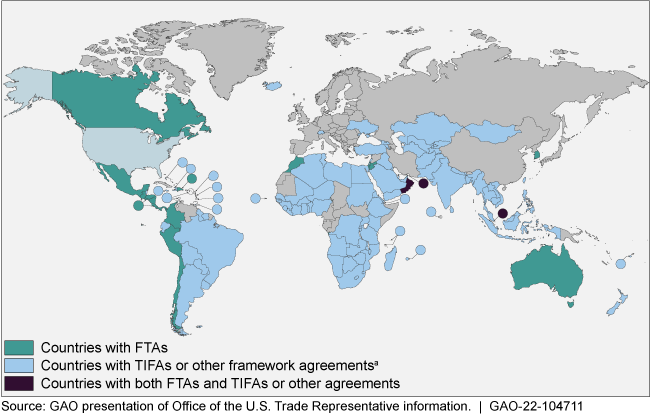International Trade: Trade Agreements Increasingly Promote Women's Rights and Economic Interests, but Barriers Remain
Fast Facts
Women's participation is a key driver of economic growth. But women may face barriers to participation—violence, restricted rights, and more. Trade agreements can help empower women to participate in economies.
A small but growing number of U.S. and other countries' trade agreements contain gender-specific provisions. Less than half of U.S. Free Trade Agreements, and 7 of 62 U.S. Trade and Investment Framework Agreements, include provisions specifically protecting women's rights and economic interests.
Also, a lack of gender-specific data has limited U.S. and global efforts to fully assess the effects of trade agreements and programs on women.
Countries with Free Trade Agreements or Trade and Investment Framework Agreements with the United States, as of September 2021

Highlights
What GAO Found
International trade is recognized as an important tool for global growth and reductions in poverty. However, women may disproportionately face barriers to trade's benefits. Less than half (6 of 14) of U.S. Free Trade Agreements (FTA) and seven of the 62 Trade Investment Framework Agreements (TIFA) include provisions explicitly protecting or promoting women's rights and economic interests. The U.S.-Mexico-Canada FTA, signed in 2020, is the only one with such provisions in the body of the agreement. However, 13 of the 14 FTAs include general protections for all workers (which may include women) and have strengthened in subsequent agreements over time. In addition, a growing number of other countries' trade agreements contain gender-specific provisions.
Though not required, the U.S. Trade Representative (USTR) and the U.S. International Trade Commission (USITC) have reported a few times on barriers that may affect women in their annual monitoring and reporting on U.S. trade agreement implementation. For example, they both reported on harassment of women in garment factories in Jordan, and on cooperative efforts to improve labor protections. Most U.S. FTAs allow parties to submit concerns about implementation of labor commitments. Our review found 10 submissions with issues specific to women that were investigated for compliance with FTA labor provisions and possible enforcement; one led to a dispute settlement proceeding.
A lack of sex-disaggregated data has limited U.S. agencies' ability to assess the effects of trade agreements and programs on women. In response, USTR has asked USITC to report specific data issues that hinder this type of assessment. According to existing studies, women have experienced a range of benefits from U.S. trade agreements and preference programs, but barriers persist. USITC found that U.S. women had employment gains and wage increases because of trade agreements, but gains were lower for women in some sectors. Other studies show that U.S. FTA partners are at different places on World Bank indicators of women's rights (see fig.) and experienced a range of benefits, such as technology upgrades, and barriers, such as access to capital. The U.S. and other countries have undertaken steps to help reduce these barriers for women.
U.S. FTA Partners' Scores on the World Bank's Women, Business and the Law Index

Why GAO Did This Study
U.S. trade agreements can create opportunities and grow the U.S. economy. Yet questions have been raised about whether women can fully benefit from them. In 2020, GAO reported on trade preference programs' protection of women and identified a range of barriers facing some women, such as gender-based violence and denying them the right to own land. This report focuses on U.S. trade agreements' protection and promotion of women's rights and economic interests.
GAO was asked to review U.S. trade agreements' promotion of women's interests in trade. This report examines (1) protections of women in U.S. trade agreements and how they compare to protections in other countries' trade agreements; (2) U.S. government agencies' efforts to monitor, report on, and enforce trade agreement provisions pertinent to women's rights and economic interests; and (3) the effects of trade, including U.S. trade agreements and preference programs, on women, and efforts to ensure women's access to the benefits of trade.
GAO analyzed U.S. free trade agreements and TIFAs, agency reports, information on agency monitoring efforts, and studies on trade's effects on women. GAO also interviewed officials who focus on trade from U.S. agencies, multilateral organizations, and other countries with agreements containing gender-specific provisions.
For more information, contact Latesha Love at (202) 512-4409 or lovel@gao.gov.
